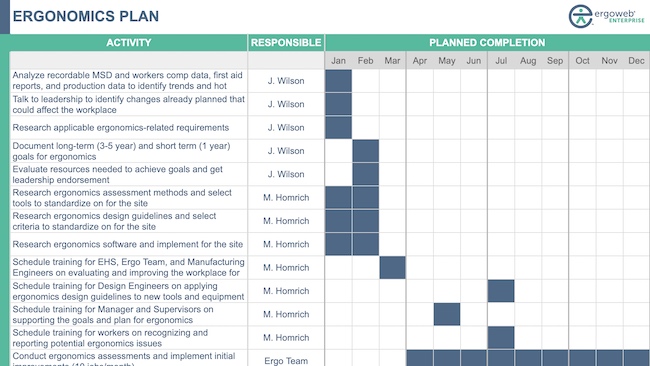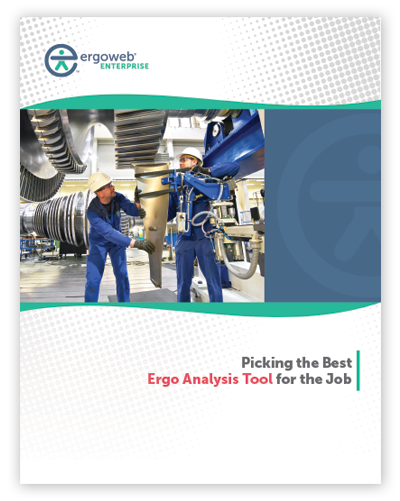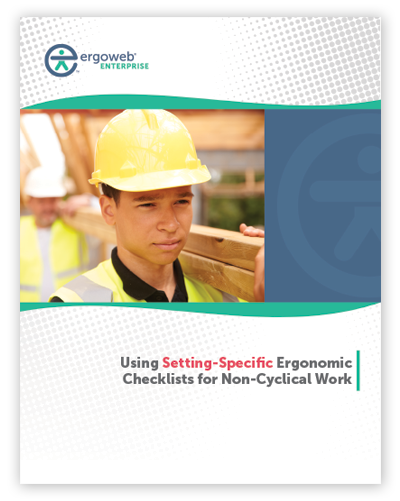Ergoweb® Learning Center
We’ve published and shared thousands of ergonomics articles and resources since 1993. Search by keyword or browse for topics of interest.
Downloadable Guides
Open Access Articles
July 29, 2014
German researchers investigated the effects of seated work vs. a mix of seated and standing work on physical and psychological complaints and on data entry performance. They found improvements in musculoskeletal comfort and mood when subjects varied working postures between sitting and standing, as compared to sitting only, with small effects on data entry performance.
June 3, 2014
Delivering comprehensive ergonomics services to large or distributed office populations is challenging, time consuming and very expensive. Sending qualified ergonomics professionals is often difficult to arrange, […]
May 13, 2014
Researcher Jim R. Potvin has proposed an equation that could have significant impact on the way ergonomists estimate risk for repetitive tasks. Potvin performed a meta-analysis of various psychophysical studies (e.g., Snook et al) that looked at the maximum acceptable efforts for a variety of tasks. He found that Duty Cycle, essentially the percentage of a job cycle that force or torque is exerted, can be used to predict maximum acceptable force and torque efforts.
April 16, 2014
Ergoweb's Peter Budnick details his views on the emerging debates surrounding the relationships between ergonomics, a field he believes is fairly well defined, and wellness, a concept that is not well defined, though intuitively appealing. "Ergonomics and wellness complement each other, but they are not one and the same," he concludes.
April 2, 2014
Anthropometry is a primary consideration in ergonomics, yet is often misunderstood and misapplied in the design of equipment and systems. In this example of why ergonomics is not always "common sense," guest contributor Bruce Bradtmiller, a leading anthropometry expert, explains why it's important to understand the complexity of anthropometry, and provides an explanation of one technique called multivariate accommodation modeling (MAM) using principal component analysis (PCA). Sound complicated? Bradtmiller cuts through the complexity and provides a simplified understanding that will make you appreciate anthropometry in a new way next time you sit in a chair or glance into the cockpit of an airplane as you board. Creating a good fit is not as easy as some might think.
February 5, 2014
Peter Budnick reviews and summarizes a chapter from "Reviews of Human Factors and Ergonomics" in which researchers Arun Garg and Jay Kapellusch provide an overview of the scientific basis and application of "Job Analysis Techniques for Distal Upper Extremity Disorders". In Part 1 of this 2 part series, Budnick covers the scientific basis for various analysis tools (to be discussed in the forthcoming Part 2) and summarizes specific data that ergonomists can use in the analysis and prevention of hand/wrist/arm workplace musculoskeletal disorders (WMSDs).
January 22, 2014
This article reviews "Corporate Ergonomics: It's Musculoskeletal Disorder Management and System Optimization," by Nancy L. J. Larson, a successful ergonomics leader in several global companies. Larson shares her experiences, successes and examples of how to promote and achieve the broad benefits of ergonomics in the real world of business. She concludes with this wise advice: "Ergonomists must communicate how ergonomics adds value to business operations in the language of business. Businesses are similar to any other end user in any ergonomics project: The same strategy is needed to ..."
January 6, 2014
Hal Hendrick wrote "The Ergonomics of Economics is the Economics of Ergonomics" over 17 years ago, and it remains very relevant today. Peter Budnick reviews the article, including a summary of many ergonomics ROI examples Hendrick collected. As Hendrick said in 1996, "... I know of no profession where so small a group of professionals has such a tremendous potential for truly making a difference ... for virtually every person on this globe."
December 23, 2013
Background A manipulator can be considered a type of power assist, or more broadly, a lift assist. The connotation of “manipulator” implies that it must be guided by […]






